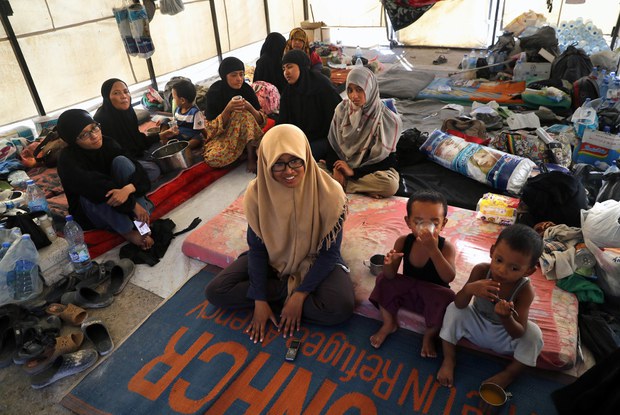Think Tank: Start Bringing Home IS-linked Indonesians from Syria
2019.08.28
Jakarta
 An Indonesian family who escaped from the Islamic State group in Raqqa gather inside their tent at a refugee camp in Ain Issa in northeastern Syria, July 24, 2017.
An Indonesian family who escaped from the Islamic State group in Raqqa gather inside their tent at a refugee camp in Ain Issa in northeastern Syria, July 24, 2017.
Indonesia should begin repatriating its most vulnerable citizens who joined the Islamic State (IS) and not let them languish in Syrian camps where they face intimidation from other supporters of the extremist group, a think tank said in a new report.
The security situation is worsening at the camps, where IS has found a new area of activity, the Jakarta-based Institute for Policy Analysis of Conflict (IPAC) said in the report titled “Indonesia: Urgent Need for a Policy on Repatriation of Pro-ISIS Nationals from Syria.”
“There’s no need to wait for an all-encompassing policy to begin to bring back those most at risk,” IPAC director Sidney Jones said in a statement accompanying the report on Tuesday.
“The government doesn’t have to decide what to do to about 200 people – it can start with five or 10,” she said.
In March this year, U.S.-backed forces declared they had captured the last IS bastion in eastern Syria after pummeling the extremist group, which once controlled a swath of land that spilled across the boundaries of Iraq and Syria.
The victory of Syrian Democratic Forces ushered in complex issues, including the extradition – or legal proceedings – for captured foreign militant fighters, as well as their wives and children.
Indonesian security officials, who visited Syria and Iraq in June, said at least 100 Indonesian men, women and children were languishing in several camps along the border between the two Middle Eastern countries.
“The problem is that the longer the government delays taking action, the greater the likelihood of intimidation in the camps and the higher the political risks of repatriation,” Jones said.
The report said inmates in the camps could be embroiled in a riot, uprising, prison break or attack, potentially leading to the sudden emptying of the camps and an inability to track them.
Women and children exposed to constant taunts or threats could become further radicalized or traumatized, IPAC said.
“The longer they stay, the more lasting the bonds that could be established with fighter families from other countries, with implications for future transnational collaboration,” it said.
More than 120 Indonesians, mostly women and children, are stranded in Syrian camps, IPAC said. It said the Indonesians were living in IS-controlled areas, but they fled after coalition fighter jets started bombing their villages in late 2018 and early 2019, and surrendered to the SDF, a predominantly Kurdish militia opposed to Syrian President Bashar al-Assad.
Some are widows of non-Indonesian foreigners whom they married in Syria, while others are married to Indonesian men who have been detained separately in SDF prisons, IPAC said.
‘There needs to be identification’
Commenting on the IPAC report, Indonesian Foreign Ministry spokesman Teuku Faizasyah said: “It’s just the opinion of a non-governmental group, and we may have different views on this issue.”
“The process is not complete because there needs to be identification,” he told BenarNews. “Many don’t have documents, so there needs to be verification – to determine whether they are Indonesian citizens or not.”
Andhika Chrisnayudhanto, director for international cooperation at the National Counter-Terrorism Agency (BNPT), said there had been several meetings involving the security ministry, the foreign ministry, BNPT and other relevant agencies to discuss the repatriation.
“But there’s still no decision that we can announce,” he told BenarNews.
“The point is we are considering various aspects, especially national security, and also relations with Syria,” he said.
IPAC said Indonesia could start with repatriating children, such as the eight orphans found in the al-Hol camp in February, and developing rehabilitation and reintegration programs for
them.
The government can also find foster families to help them get a new start, it said.
If repatriated, Indonesians who played important roles in IS, like SDF detainee Munawar Kholil, could provide important information about the militant group’s plans for Southeast Asia and its financial links with regional affiliates, IPAC said.
Kholil, 32, acted as an IS recruiter before he went to Syria in 2012, IPAC said.
“What then are the costs to bringing him back when the advantages of doing so are obvious? At least it is worth considering as a test case, a high-value detainee who could be brought back to certain prosecution but who could potentially be an ally of the government if well-treated,” it said.
How other countries are responding
With the demise of IS’ self-proclaimed caliphate, European countries are also grappling with the fate of their citizens in Syria.
Britain and some other countries have refused to repatriate their citizens who joined IS.
The British government has revoked the citizenship of some nationals, including Shamima Begum, a 19-year-old woman of Bangladeshi parentage who ran away from her home in London and made her way to Syria with two other teenage girls in 2015.
While Britain allows dual nationality, Indonesia recognizes it only for children up to 18 years, with a 3-year grace period. By the time children turn 21, they are required to notify Indonesian immigration authorities if they intend to keep their citizenship or release it in favor of the other nationality.
In 2017, BNPT reported that at least 1,321 Indonesians had joined IS or tried to enlist. Of that number, 84 were killed, 482 were deported while trying to enter Syria, and 62 had returned from Syria. Another 63 were stopped at Indonesian airports while trying to travel to the Middle East.
Citing intelligence data from his government, Indonesian Defense Minister Ryamizard Ryacudu told a security forum in Singapore last year that about 400 out of 31,500 foreign fighters who had joined IS in Syria were from Indonesia.







